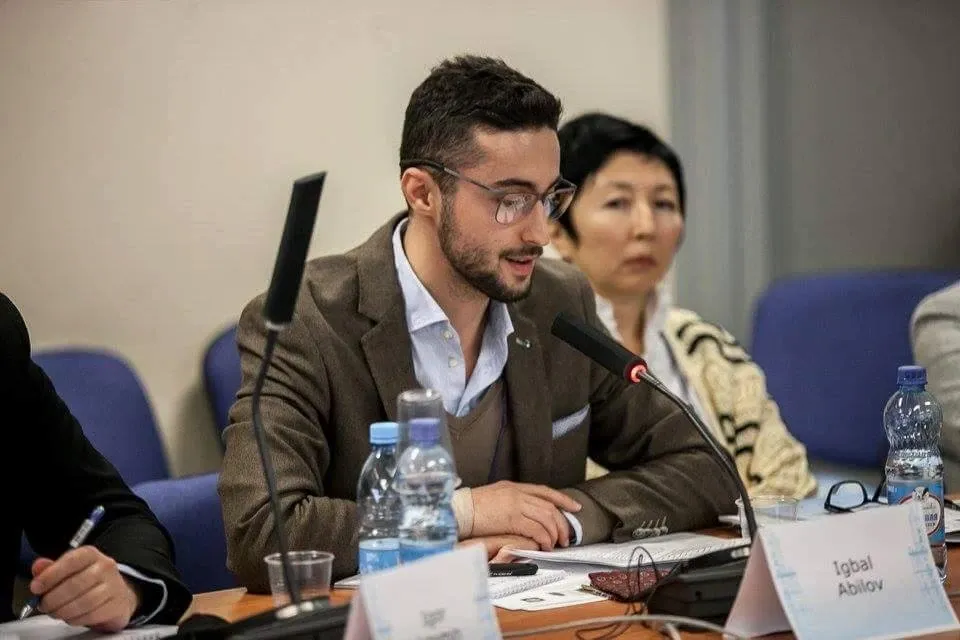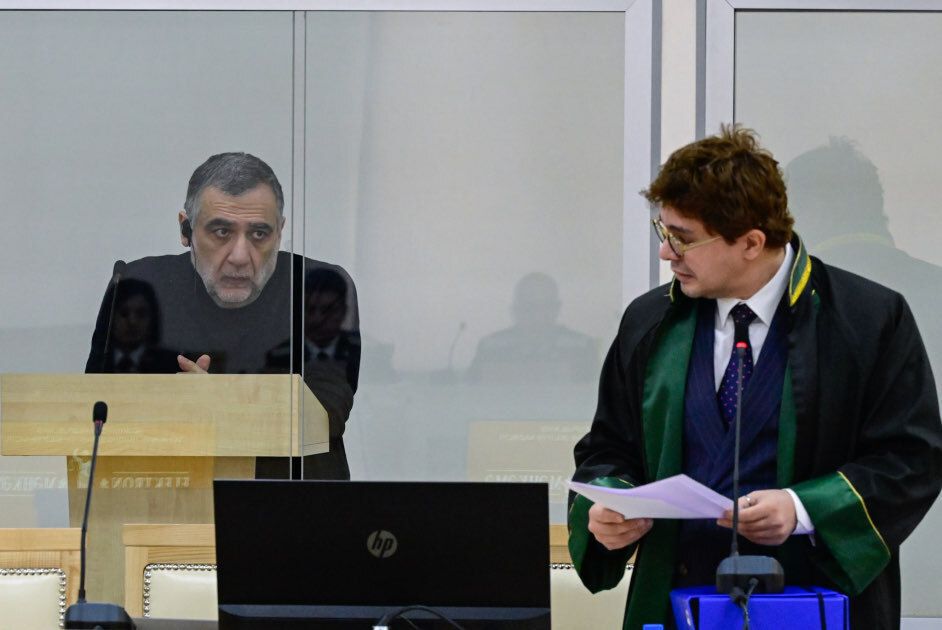While this publication was being prepared for release, on August 8, 2025, Azerbaijan and Armenia signed a peace declaration at the White House in Washington, D.C. The peace treaty is expected to be signed in the future. Although the Armenian side made significant concessions — omitting the issue of the return of Armenian prisoners of war and the rights of Karabakh Armenians — for them, the signing of the declaration became at least some guarantee of avoiding another painful war.
I postponed writing this piece for a long time. In February, when Bakhruz Samedov went on hunger strike in a Baku prison, I realized that staying silent was a crime. Gathering material was difficult — many people refused to speak being afraid of arrest. I dedicate this text to all those who longed for peace but ended up in Azerbaijani prisons.
As delegates at the 29th UN Climate Change Conference in Baku discussed saving the planet, Igbal Abilov awaited his verdict in a pretrial detention cell. His “crime” — trying to preserve the Talysh language, which the Azerbaijani government calls a threat to the state. Around the same time, homes of Karabakh Armenians stood empty, their owners now refugees or captives in a campaign the UN cautiously labels “ethnic cleansing.” The world prefers not to see how climate slogans serve as a smokescreen for repression.
Climate Greenwashing
Azerbaijan recently hosted the 29th UN Climate Change Conference (COP29), officially framed as a way to address climate-related issues. It took place shortly after all ethnic Armenians of Karabakh (Arm. Artsakh) were forced to leave following a long blockade. High-ranking regional officials and civilians were captured by Azerbaijan, and dozens of POWs have still not been repatriated to Armenia after hostilities ended.
Azerbaijan is an oil-rich country whose economy depends heavily on fossil fuel exports. The consulting firm Teneo played a key role in preparing Azerbaijan for COP29 by developing a “green narrative” to improve the image of both the country and BP, a key oil exporter from Azerbaijan.
“I wanted to attend the conference to represent the Armenian position, but deported Armenians were not allowed to participate. Azerbaijan violated international norms and denied visas to Armenians, including NGOs. Amid global events, this went largely unnoticed. Major organizations, by attending and staying silent on minority rights, showed both Aliyev’s influence and the weakness of civil society,” says Arshak Makichyan, a Russian-Armenian climate and antiwar activist.
According to the WHO’s 2023 report, air pollution levels in Azerbaijan far exceed safe thresholds. It states that 1 in 100,000 children under five dies from environment-related poisoning. Certain eco-activists, including Greta Thunberg, said the event was used to divert attention from a humanitarian crisis.
Azerbaijani Political Prisoners
Human rights organizations estimate that Azerbaijan holds over 300 political prisoners, including 23 journalists. Right before COP29, a new wave of arrests took place.
One of the detainees is Igbal Abilov, a Belarus-based Talysh researcher and editor of the Talysh National Academy Bulletin. He studied the cultures of Turkey and the South Caucasus, including Azerbaijanis, Talysh, and Turks.

In July 2024, Azerbaijani forces detained Igbal during a family wedding visit. After a six-hour interrogation at the state security service, he was released. Days later, as he prepared to return to Belarus, he discovered that he was under a travel ban. His passport and phones were seized. When summoned to retrieve his belongings, he was re-arrested. He was charged with treason, incitement of ethnic and religious hatred, and anti-state propaganda. Pro-government media published summaries of the charges, violating the presumption of innocence.
His lawyers insist the accusations are baseless, and court materials lack evidence. Friends launched a Telegram channel #freeigbal to share updates on his case.
In May, the court sentenced Igbal to 18 years in prison under three treason-related articles. A colleague and ethnographer, speaking anonymously, said:
“His persecution is politically motivated. He wasn’t an activist — he was a scholar of the South Caucasus, Turkey, and Iran. He preserved Talysh heritage, continuing the work of other persecuted Talysh scholars. His case finally pushed Azerbaijan to acknowledge political repression of Talysh activists.”
Igbal’s short film Fragments won an award at the Monza Film Festival in Italy, but he learned about it while in custody.
The Case of Bakhruz Samedov
In August 2024, security services detained Bakhruz Samedov — a researcher and PhD student at Charles University — during a visit to his grandmother in Baku. During the 2020 Karabakh war, Bakhruz publicly criticized the Aliyev regime and condemned the conflict.
His 83-year-old grandmother, Zibeyda Osmanova, said authorities searched their home and seized his electronics, documents, and published works. Initially, he was accused of drug distribution — a common tactic used against dissidents — but was later formally charged with treason for his communications with Armenians and criticism of the government.
“I’ve known Bakhruz for 12 years. We met through political activism. His arrest was due to his scholarly work promoting peace and condemning war,” says Amra, a friend.
In April 2025, Bakhruz wrote an open letter to Armenian PM Nikol Pashinyan, asking him to confirm that he never cooperated with the Armenian intelligence and expressing hope for peace between Armenia and Azerbaijan.
On June 23, the Baku Grave Crimes Court sentenced Bakhruz to 15 years in prison for treason.
Religious Persecution
Despite official claims of religious freedom, Azerbaijan tightly controls religious life. The 2025 U.S. Commission on International Religious Freedom report noted ongoing arrests of Shia Muslims accused of Iranian ties. Many are charged with drug trafficking, a frequently used tool for repressing dissidents, according to the U.S. Commission on International Religious Freedom’s 2025 report.
According to the Union for the Freedom of Political Prisoners of Azerbaijan, 233 people were imprisoned in 2025 for their beliefs or opposition to the regime. Shia clerics report being framed with planted drugs and tortured into false confessions.
One anonymous interviewee shared:
“I’m an ethnic Azerbaijani working in IT and a Sunni Muslim. Azerbaijan is mostly Shia. In the 1990s, the state allowed loyalist Salafi preachers to act freely to counter Iranian influence. In 2015, when we were working on infrastructure for the European Games in Baku, a colleague warned me that the Ministry of National Security had asked for a list of religious employees. I was wrongly flagged as a Salafi. Though I had worked for years without issue, I faced bullying, jokes, and discrimination. Later, during layoffs, many flagged employees were fired. I wasn’t, due to my importance to the company, but the hostile environment drove me to seek work abroad. Having worked in six countries since, I’ve never experienced Islamophobia as intense as in Azerbaijan.”
Armenian Captives and the Closure of the Red Cross Office
Many Armenians remain detained in Azerbaijan following the 2020 war, the blockade of Artsakh, and the region’s capture. Article 118 of the Third Geneva Convention requires the prompt release and repatriation of POWs after fighting ends. Yet human rights groups say at least 135 Armenians — POWs, civilians, and political prisoners — remain detained. Only 55 are officially confirmed; the fate of the others is unknown.
After Azerbaijan’s 2023 military operation, eight high-ranking Artsakh officials were arrested, including ex-minister Ruben Vardanyan and former foreign minister David Babayan. Azerbaijan accuses them of terrorism and war crimes. Vardanyan moved to Artsakh during the blockade in 2022 and served as the state minister for only four months.

Lara, a displaced Artsakh resident now in Armenia, recalls:
“I worked with Ruben Vardanyan on educational and social programs. Thanks to him, we had "Matena" leadership and motivation courses, from which I graduated. Together we have also initiated the restoration of the ancient Hakobavank monastery, to which we later made collective pilgrimages.
During the blockade, we had a catastrophic shortage of food. Ruben opened a public kitchen where anyone could have a meal at least once a day. He also arranged transportation for pregnant women and critically ill patients.”
Court hearings take place behind closed doors, without international observers, raising concerns about fairness and transparency.
The International Committee of the Red Cross (ICRC) has lost access to the detainees. In March 2025, Azerbaijan shut down its Baku office, accusing the ICRC of using ambulances for smuggling — a charge the ICRC denies. It remains the only organization under international humanitarian law with a mandate to visit war-related detainees. During these visits ICRC usually inspects captives’ treatment and living conditions, and makes sure that their human rights are being respected.
The Peace Plan
In March 2025, Armenia and Azerbaijan announced they had finalized a peace treaty text. The main obstacle is that Azerbaijan demands that Armenia amend its constitution to remove references to Nagorno-Karabakh or its territorial claims.
Despite Armenia’s unilateral concessions — including painful silence on POWs — the treaty remains unsigned, stalled between diplomacy and political bargaining.